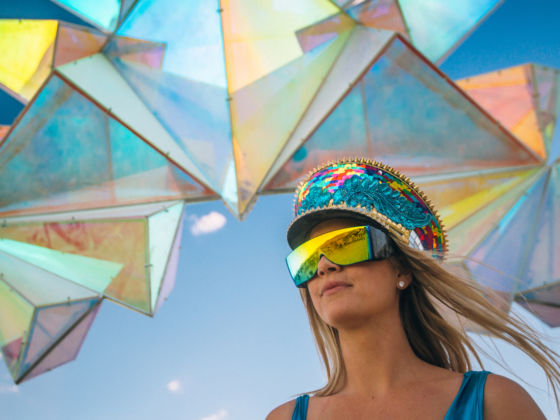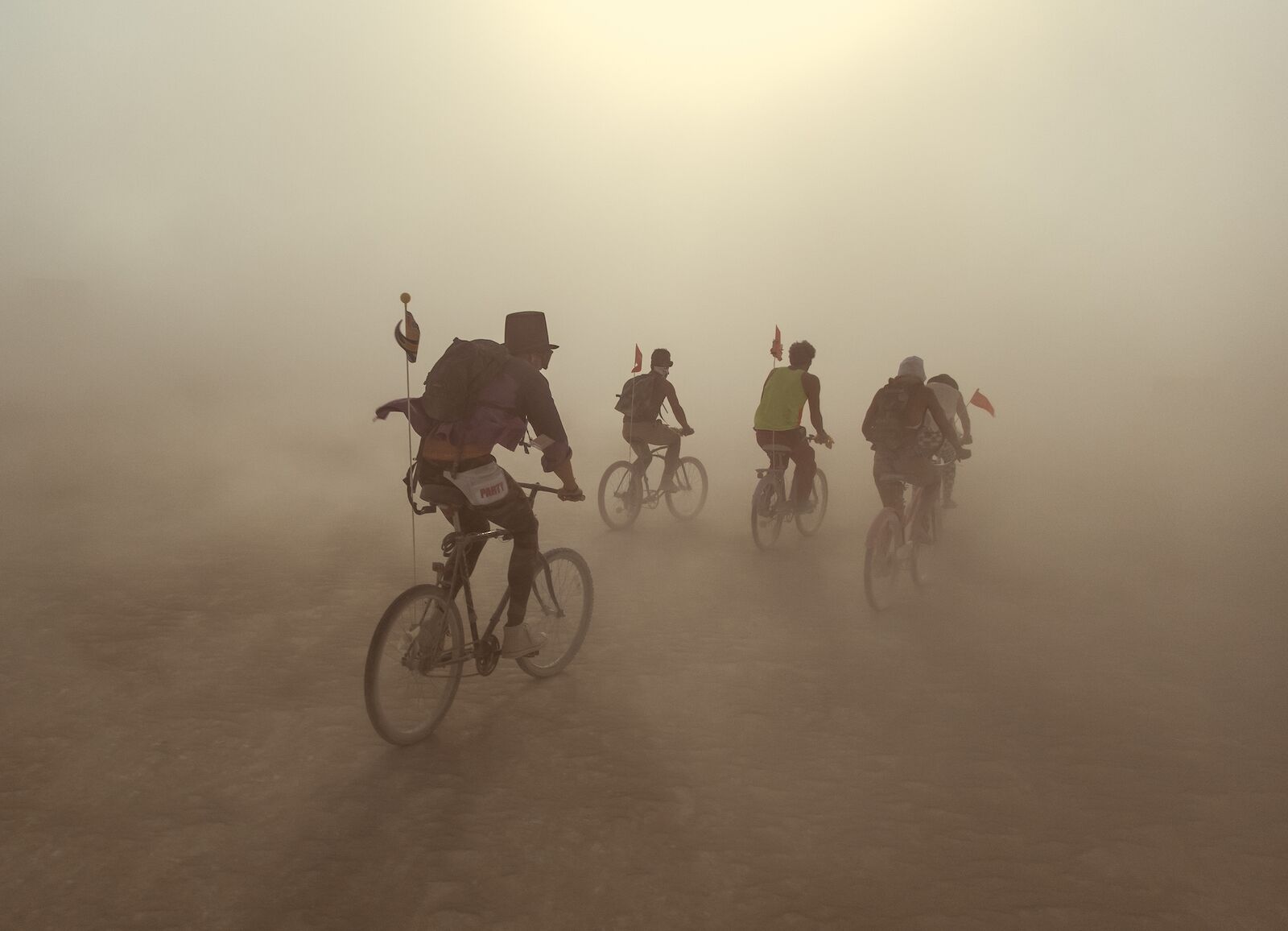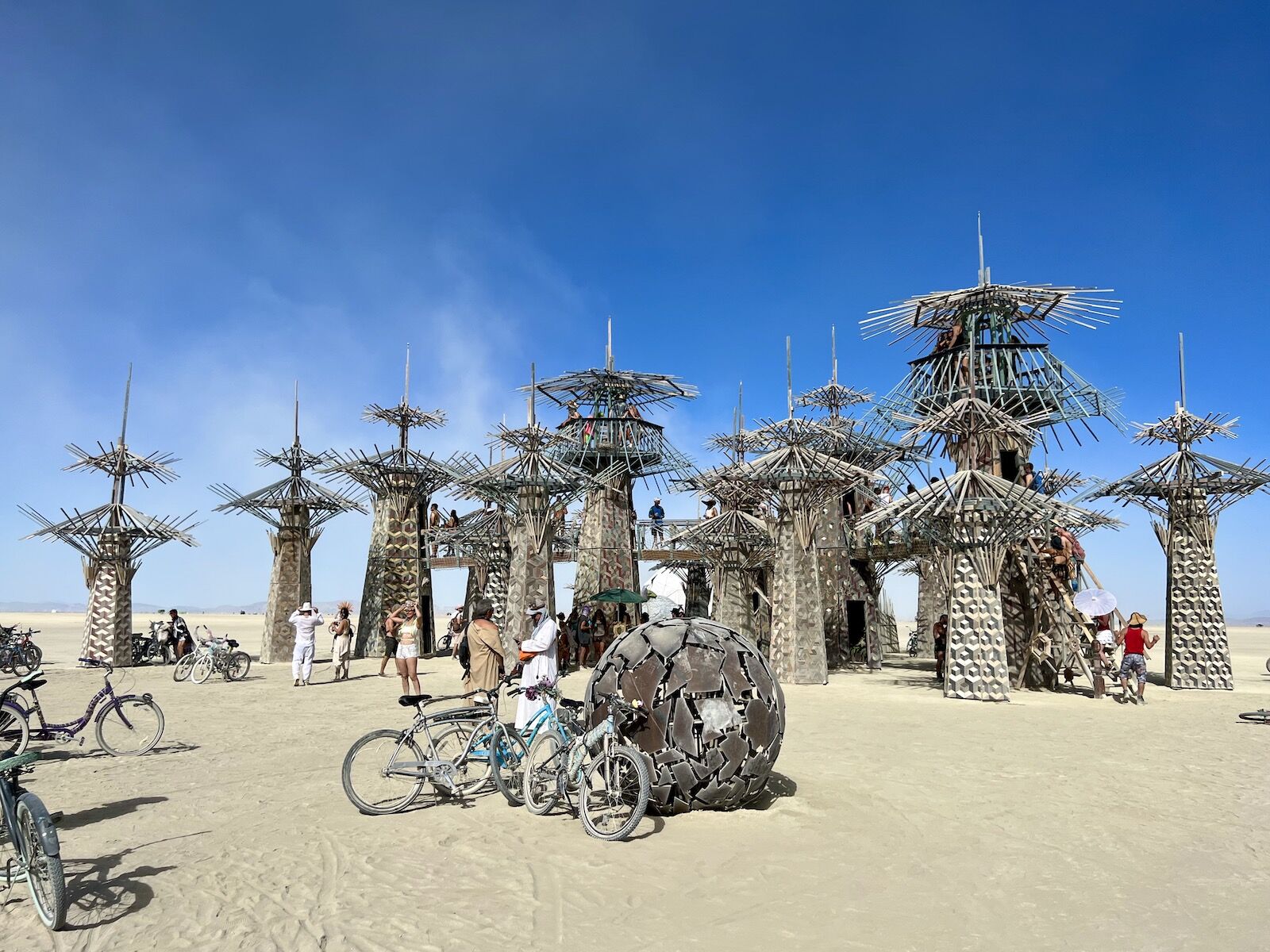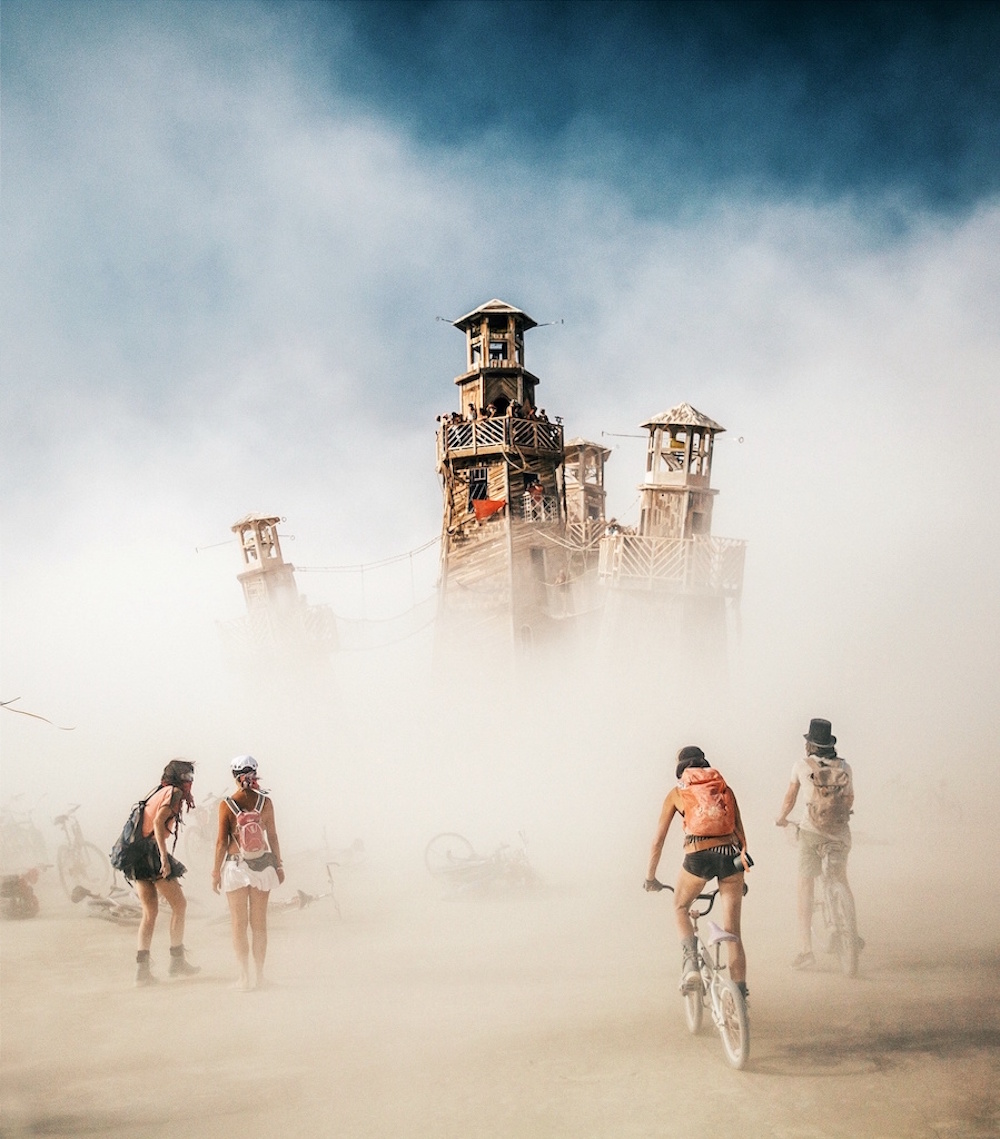BURNING MAN is an experiment in building an interactive art-based community structure and in promoting self-reliance and exchanging gifts over commercialism. These are the high ideals; it can also be an opportunity to get naked, dance like a person possessed, and take some Instagram selfies perched on top of a sculpture made out of trucks melted together.


The Ultimate Guide to Burning Man 2017
How to get tickets for Burning Man 2017
If you haven’t got one now, you’re in trouble. Tickets sold out months ago — the main ticket sale usually opens in January and sells out within a few hours. You still have a chance to register for the OMG Sale as long as you do it before noon PDT on July 28 — the OMG sale is on August 2nd. Otherwise, check ePlaya for threads of tickets offered or post your sob story under “Tickets Wanted.” Don’t buy tickets off Craiglist; most of the time they are either scalpers selling for way over face value (against the ideals of the event) or scammers (the ticket you buy may have come from a pile of deleted numbers, which means you might get to Gate and have your ticket register as invalid). Your best bet is to ask around among people you know might be going.
How to get to Black Rock City

Photo: Kevin Sutton/Shutterstock
The easiest and lowest-cost way is to drive yourself. This way, you have space to bring as many supplies as you can fit: your camping equipment, your clothing, and all the reusable items you need to make the experience as low-waste to no-waste as possible. Driving has a lower carbon footprint than plane travel; however, keep in mind that the roads you take to get to Burning Man are narrow and heavily-traveled by long-distance truckers. You may be sleep-deprived going in or out, and there is no pulling over on the side of highway 447. Traffic is also very congested in and around Black Rock City before and after the event, as 70,000 people travel on a remote country highway designed for occasional truck traffic.
You can also fly in. This usually means catching a flight to Reno and finding some kind of transportation to the event from there. You have multiple options: you can rideshare with someone who has a car and wants to reduce their gas costs by bringing in other participants (check the ePlaya rideshare board); you can rent a car from any of the usual car rental agencies; or you could take a transit service.
There are two bus services operating rides to Burning Man: the Burner Express, which is a shuttle service provided by the event for people traveling from San Francisco or Reno; and the Green Tortoise. The Burner Express has been provided by the organization in an effort to reduce the carbon footprint; they are aware that tens of thousands of individual cars flooding the area with exhaust does nothing for the environment and are trying to encourage public transit by offering a chance to skip the lines. Burner Express only allows two bags (and a bike add-on, if you pay extra) and bypasses normal Gate traffic, which saves you easily 8-12 hours of waiting in line. The Green Tortoise is a package deal; for a larger fee, they offer a spot in their camp, transport from San Francisco or Reno, and meals. Green Tortoise does not get access to the special bus access lane, so you sit in line with everyone else.
Burner Express and a few other services offer private flights to the Black Rock City Airport. For a much larger fee, you can really skip the lines and fly direct from small airports in Nevada and California, bringing a very small amount of luggage. If you have a friend who’s a pilot and has a ticket, you might be able to coerce them into flying there and taking you, which will save you a bundle. Be warned, though: I have a friend who’s a professional pilot, and he says that the downdrafts of the dry lakebed make it a very difficult takeoff and landing, so expect some bumps.
Where to stay

Photo: Noelle Salmi
At Burning Man, life is much easier if you stay within a larger, organized camp. Some theme camps are still looking for members, so check the ePlaya listings for options. A ticket is not included, but you will have an infrastructure and a place to stay (you will need to bring your tent, but generally, the kitchen, shade cloth, storage, and water situation will be dealt with.) Many camps charge member dues, and it would be swell of you to be there for either set-up or tear-down. You get extra mega bonus points if you do both, and will probably be invited back with a red-carpet rollout for the following year.
If you can’t find a camp, there’s always open camping. Areas of the city are designated as available to anyone who wants to plunk down a tent, and you don’t have to ask permission — these areas are clearly labelled on the map you receive in your booklet when you go through the Gate. You will meet new friends no matter where you camp, but you may need to rely on your neighbors more if you’re in open camping, since you don’t have an existing infrastructure to help you out.
What to bring and not bring
First, bring your ticket. If you don’t have a ticket, you cannot wait at Gate for your friend to bring it to you. You cannot buy one at the entry point or see if anyone hasn’t claimed their Will Call ticket. The only thing that happens is that you must return to Reno. Whoever’s car you have come in will have to turn around and take you back because they are not legally allowed to drive away and leave you at Gate; even if you just met a few hours ago in the airport. Your action (or inaction) will leave you in the literal dust. You cannot wait in Gerlach (the closest town) because there is nowhere for you to stay.
The other things you bring depend on how you want to do the event. I have never brought an RV, but I know many people who won’t go without one. I have never brought (or even really taken) a shower, but many Burners take one every day. I never have problems with my feet, so closed-toe boots and vinegar for foot washes are never on my list, but I hear that some people have problems with the alkaline dust. I have even done the event without a bike, walking everywhere and hitching rides on art cars. I do recommend that you bring or have access to shade cloth and some way to boil water, since both of these things will make your stay much more pleasant — a cup of noodles at 11 PM is sometimes the best thing you can imagine, and having a nap when the sun is beating down might be even better.

Scott Sporleder
Some things I would certainly never go without are:
- Wipes (you can pack some small wet cloth in zip lock bags and stick them in your cooler)
- Goggles (with switchable night-time lenses for whiteouts at night)
- A bandana
- Sturdy rather than stylish shoes (as Burners say, “Your costume ends at the ankles.”)
- Enough food and water to support yourself
- A positive helpful attitude
You’ve probably heard of the gift economy already. Don’t take little trinkets from the dollar store; the event is leave-no-trace, so handing out knick-knacks is actually worse than giving nothing tangible at all. Offer assistance, sunscreen, spare tissues or wipes, or whatever else you might be good at. I personally don’t drink or engage in recreational substances, but I hear that bringing some alcohol to share with other people is often well-received. Also, bring a cup, so you can get some gift drinks of your own. If you want a generalized packing list, there’s one here.
What not to bring is a longer list, especially if you’re aspiring to be environmentally responsible. Burning Man is a catastrophe in terms of environmental impact: thousands of people drive individual cars into a remote desert, hauling a bunch of machinery and equipment, burn a lot of stuff using wicked accelerants, and pack out a ton of trash. The roads are littered with debris after the event is over, either from improperly secured recycling bags on the back of trailers, or from people who thought the highway was a dumping ground and left their week of accumulated garbage for someone else to clean. First on this list should be: DON’T bring individual plastic water bottles. Get your water for the week in 5-gallon or 10-gallon jugs if possible. Individual plastic bottles are a pain to pack out and recycle, and a terrible waste of resources. If you leave on Monday afternoon, you will see flats of unopened water bottles abandoned by camps.
What to do and not to do
There is so much to do at Burning Man that two things are true: one, you will always find something amazing to occupy yourself, and two, you will never see everything. Every year after the event, I see people’s pictures and marvel at the truly enormous pieces of art that I didn’t even know existed. My friend Sky and I biked around the very edges of the city one year and there were whole camp setups I’d never heard of, with people who never went into the center (where everyone claims everything is happening). It was an entirely different Burn for them vs. people who spent every day on the Esplanade or following the art placement map. If you keep in mind that you will simultaneously be enjoying yourself and suffering from FOMO, you’ll be fine.
Try to have no expectations for the kind of experience you want to have. You’ve heard a lot of stories about this event. You probably looked at a lot of pictures and read the survival guide (if you didn’t, you should). You know people say to fall in love WITH Burning Man, not AT Burning Man. But you’re probably harboring all kinds of thoughts: meeting new friends, meeting new sex partners, taking some drugs and dancing under the moon, weathering a dust storm with kindred spirits. Those may happen…but they are not guaranteed, and you may not enjoy the outcomes. Sometimes you get a double rainbow after a short cloudburst on the playa, and sometimes you get a fourteen-hour wait to enter because it keeps raining and nobody can drive their cars or bikes as long as the ground is wet. It’s best to have expectations only about things you can marginally control: what you wear, where you go, what you eat, when you sleep.
Generally, don’t be a jerk. Don’t take what isn’t offered, always ask for consent, and be prepared for an overwhelming attitude of low sarcasm and high sincerity. People are prepared to have weird experiences at Burning Man, and almost everyone is friendly and willing to talk. Don’t take pictures of naked people without asking. Spend some time in Center Camp just to see what all the fuss is about, but try to avoid buying coffee if you can. It’s nice to avoid money for a week. Try to make dates to see your friends who will be at Burning Man before you go, with the knowledge that probably none of you will have watches and everybody will be distracted, so you may never see the people you want to see. I count it as a miracle if I manage to find people in my own camp consistently. Don’t be afraid to use medical services if you need them. And the usual: eat, pee, drink water, sleep. Don’t get so distracted by everything around you that you forget to pace yourself and collapse by the end of the week. Try not to have too many nights of staying up to watch the sun rise, although the loud music generally fades away before dawn. Be open to everything, especially the fragile amazing desert, washes, and mountains around you. They will remind you that you are only a temporary guest.
Further notes on reducing trash
It bears repeating: Burning Man is a leave-no-trace event. Pack it in, pack it out. The problem is that most people bring way too much stuff. I saw another article somewhere that listed the author’s costuming expenses at $500…that is way, way too many costumes. It’s only a week and you can’t bring anything with feathers or glitter because it falls off, turns into MOOP (matter out of place), and needs to be picked up. Most of the stuff that people buy especially for this event is nonreusable, cheap garbage which often just ends up junked when you can’t get the dust off it. Don’t buy a bunch of disposable camp equipment with the idea that you’ll throw it in the trash (or donate it to a secondhand store in Reno — Goodwill does not want your super dusty broken armchair).
Try to bring reusable supplies wherever possible. Get good quality headlamps instead of cheap ones that break, and try to pitch in or trade with other people whenever possible. The Kiwanis Club of Reno has a bike reservation program: $50 and you pick up a bike from them at their volunteer-run location before the event, and you can drop it back off afterwards. You could also take it with you if you want; they only ask you not abandon it on the playa. Trader Joe’s and Wal-Mart in Reno also frequently take back unopened food and water starting the final Sunday of the event. If you have a lot of things you want to get rid of, check out this excellent local list of organizations that will take donations. Homeless shelters and soup kitchens would love your (functional, undamaged) items to give to their recipients.
The more you plan, the less waste you have. Don’t leave things until the last minute and assume the playa will provide. Radical self-reliance starts at home. Bring reusable water bottles that can double as coffee cups. Leave food in the sun to dry out and burn it in the burn barrels scattered around the city. Carpool or take as much public transit as possible and encourage friends to do the same. Pooling our resources and relying on the community is not just the best way to build an amazing and enjoyable event, it’s also better for the future of our planet.